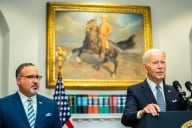You have /5 articles left.
Sign up for a free account or log in.
Michigan State University and the National Collegiate Athletic Association are facing scrutiny not only over the actions of a doctor who abused scores of women, but over athletes alleged to have raped and assaulted others. The university and the NCAA are both being accused of effectively looking the other way.
An investigation by ESPN published Friday has uncovered numerous cases where the university apparently knew of but did little about accusations of sexual assaults committed by its athletes. The university, according to ESPN's report, even took legal action to keep information on sexual assault cases under wraps.
In 2014, ESPN sued when the university failed to comply with the state’s open records laws and provided the broadcaster with redacted police records involving football and basketball players. The university proactively filed a lawsuit that defended this exclusion of information. A judge dismissed the lawsuit, saying that if it were successful, the case could deter others from requesting public records.
Two of the university’s best known sports figures -- football coach Mark Dantonio and basketball coach Tom Izzo -- have led teams while cases of alleged sexual assault committed by their players were overlooked over the years, the ESPN report said.
Although Dantonio was reportedly involved in disciplining one case several years ago, in June he told reporters in response to questions about two cases of sexual assault alleged to have been committed by his football players that no instances had happened previously. “This is new ground for us,” Dantonio told the reporters.
In one case, a Michigan State student described being dragged into a bathroom during a party and forced to perform oral sex on three football players. The second case, reported in April last year, involved a defensive end allegedly assaulting a woman in her apartment. The perpetrator was charged with third-degree criminal sexual conduct.
Lauren Allswede, who spent seven years at Michigan State as a sexual assault counselor, resigned in 2015 over frustrations that officials were not dealing with sexual assault cases. The university was misguided in giving the sports department authority to handle such allegations, Allswede told ESPN.
"Whatever protocol or policy was in place, whatever front-line staff might normally be involved in response or investigation, it all got kind of swept away and it was handled more by administration [and] athletic department officials," Allswede told ESPN. "It was all happening behind closed doors … None of it was transparent or included people who would normally be involved in certain decisions."
The ESPN piece also details accusations against basketball players. One of those cases, in 2010, was the subject of local media reports and protests, prompting the U.S. Department of Education’s Office for Civil Rights to contact Michigan State. After a female student reported that two male students cornered and sexually assaulted her, the university did not start a Title IX investigation, as required by federal law. After undertaking an investigation, the university’s outside lawyer found the two men weren’t in violation of college policy. The men accused played in every game that year, and by all accounts did not receive any punishment from coaches.
Michigan State spokesperson Jason Cody responded to ESPN, saying that the campus was working “diligently” on the issue, while admitting some fault in mishandled sexual assault cases.
"Over the past several years, we have dedicated significant new resources to strengthening our efforts to combat sexual violence. Every day, people across campus are working diligently on this critical issue. We acknowledge, however, that we have sometimes fallen short of our goal and the expectations of others. It is clear more needs to be done, and we are using every resource available to get better,” Cody wrote in a statement.
What Did the NCAA Know?
The NCAA is also being criticized over allegations that it was told about a problem with sexual assaults by Michigan State athletes and did nothing, as reported by The Athletic.
In November 2010, six months after he was hired, NCAA president Mark Emmert received a letter from Kathy Redmond, an advocate for victims of rape and sexual assault, urging him to examine Michigan State’s handling of sexual assault.
Redmond, the founder of the National Coalition Against Violent Athletes, wrote in the letter that 37 reports of sexual assault committed by Michigan State athletes in the two years before 2010 went undisciplined.
In response to The Atlantic's reporting, Emmert defended his actions on Saturday in a letter to university presidents overseen by the NCAA. While Emmert admitted the NCAA has a ways to go in preventing sexual assault on campuses, he said any claims that he or the organization were not reporting crimes were “blatantly false.”








